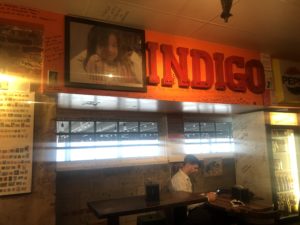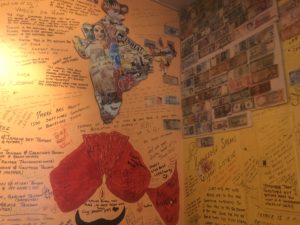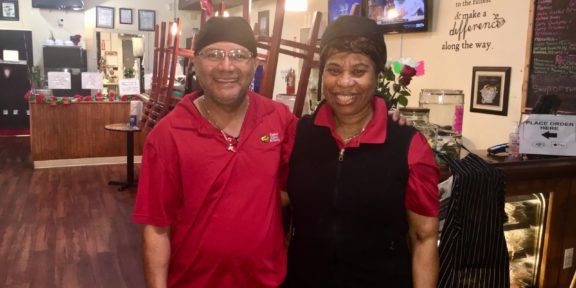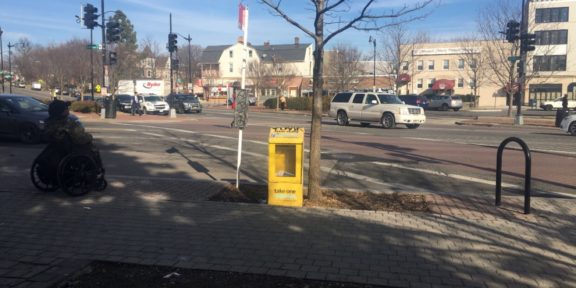INDIGO. It’s a blend of the words Indian Food on the Go, just like how owners Dinesh and Nidhi Tandon have blended Indian culture into their American life.
Outside INDIGO is a picture Dinesh created. He said, “I told [the artist] to blend the two flags together: [the] Indian flag and the American flag that represents our family how blended we are into this society now into this culture.”
The Tandon’s are Indian immigrants. Their family arrived in America in 2002, and their youngest child was born in America a few years later. After more than 20 years, they consider themselves Indians with many American traits.
Indians are the second-largest nationality to immigrate to America after Mexicans. Many settle into the U.S because of their firm grasp on English and high levels of education. 40% of Indians who immigrated to America arrived with a post-graduate degree.
However, Indians are not without their challenges in America.
“We expect any day now that a rule will drop in the federal register that basically could take away the right for South Asian women to work. Specifically, South Asian women who are on H4 visas,” said Sophia Qureshi of SAALT (South Asian Americans Leading Together). H4 visas are provided to dependents of those who are in the country for temporary employment on H-1B visas to work. An H4 visa allows a dependent to accompany someone during their stay.
The couple started INDIGO in early 2010 out of a five-by-five stand in Union Station outside the North Hall. Nidhi did all of the cooking, starting at the early hours of the morning and transported all the food from Virginia to their stall.
“We were always like looking for some authentic Indian food. But all the places in town would say authentic, but there was nothing authentic about it. You know we felt that there is nothing authentic about it” said Dinesh “ We were more focused on healthy food and the way we eat at home (back home) We wanted to give that experience to the people.”
The Tandon’s stint in Union Station didn’t last long. “We started getting a lot of business at the food court. So there were people who stood up going inside looking for Indian food in the basement. They would stay at the food court and the people, you know, I guess the restaurant owner didn’t like it much” said Dinesh. “They were paying hefty rents to be in the Union Station. And so the management wanted us not to continue. And thenm, after two months, we had to leave the car.”
The duo relocated to Eastern Market for the next three years to grow their customer base. People enjoyed their food, and eventually, they grew enough to become full-time restaurant owners. For them, it was a big step – Dinesh would have to abandon his stable job in the auto industry and invest his money and his family into a business that could fail.
The family relocated to D.C. and moved into what is now the permanent location of INDIGO in Northeast. They moved from a larger house to a smaller one where everyone shared rooms and common space to make their dream happen.
“I live four or five blocks away, so I love the food and the vibe. I also walk my dog by here almost every day and so I always smell it, and it always smells so good an, so it’s always on my mind to come here,” said Jenna Rosen. “The food feels a lot lighter. Some Indian food is oilier or richer, and it’s so intense. This just feels very fresh and healthy.”
“I think when you go to an Indian restaurant you always get chicken tikka masala and you’re like ‘oh it’s so good,’ but it tastes the same at every Indian restaurant. I feel like this one has such unique flavors that you might not necessarily get at a normal Indian restaurant” said Adams.
In the last five years, INDIGO has gone from the Tandon kids working the storefront to a staff of 20-25 people running the shop. It’s become a melting pot, as many of their staff are Hispanic and many of their original customers were white and African American. The choice of staff came from their experiences with other Indians. The Tandons aren’t conventionally trained chefs. Nidhi came up with all the recipes from techniques she learned in India, and the food she made for her family.
“For INDIGO if you try to bring an Indian person to help us in the kitchen. They feel that they already know the food and they will try their own recipe and people don’t want them to try their own recipes our recipes are completely different from regular and Indian recipes,” said Dinesh. Nidhi teaches her staff how to season the food, and she still creates the bases.
Over the last ten years, it seems like the Tandon’s have found the American dream. They’ve created a successful business and are looking to open another location soon. They even still have the stall at Eastern Market that they started in so many years ago. Even their children, who are “truly Indian-American” as the Tandon’s say, have found their niche in the Washington region. Even in the current political climate, the Tandon’s say that they’ve only ever been respected and uplifted by their community.
Frequent customer Jamie Cheng said, “It’s good quality [food]. It tastes like home cooking, and in this area is some of the only good food.” That, the Tandon family says, sums up precisely what INDIGO was meant to be.




